|
|
|
Sort Order |
|
|
|
Items / Page
|
|
|
|
|
|
|
| Srl | Item |
| 1 |
ID:
174913
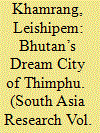

|
|
|
|
|
| Summary/Abstract |
Buttressed by the philosophy of Gross National Happiness (GNH), Bhutan’s development policies are inherently grounded in balancing material and spiritual well-being, while Bhutan’s capital city, Thimphu, has over the past few decades experienced phenomenal growth and urban transformation. This article builds on the notion of socio-spatial dialectic to examine the new forms of social ordering in the urban space of Thimphu. Critiquing the idealisation of Thimphu as a dream city for all, it endorses instead the development of regional growth centres and small towns. This underlines the potential of stimulating regional economic development, as a better strategy for inclusive growth and actualisation of Bhutan’s philosophy of GNH.
|
|
|
|
|
|
|
|
|
|
|
|
|
|
|
|
| 2 |
ID:
174915
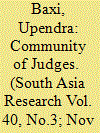

|
|
|
| 3 |
ID:
174914
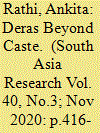

|
|
|
|
|
| Summary/Abstract |
In the northern regions of India, the rising popularity of alternative religious sects, prominently Deras, has sparked much interest in explaining this phenomenon. Current literature, based on case studies of specific Dalit Deras, relates the emergence of these religious sects to caste-based social discrimination and exclusion of lower castes by the mainstream Sikh religion. This article presents a case study of a small town, Patran, in the state of Punjab. Confirming the popularity of these alternative religious sects for upper and lower castes in the town, the article argues that the contemporary attractiveness of Deras needs to be understood also as a result of localised agrarian dynamics and related social pressures engendered by the process of rural to urban and agrarian to non-agrarian transition.
|
|
|
|
|
|
|
|
|
|
|
|
|
|
|
|
| 4 |
ID:
174910
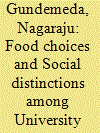

|
|
|
|
|
| Summary/Abstract |
Based on empirical study, designed to capture the views of students in a leading Indian university on diverse types of dietary choices, this article specifically examines the extent of acceptability of beef and pork in hostel menus. The study found that while only widely accepted vegetarian and non-vegetarian food items like chicken and mutton featured in mess menus, the scale of social tolerance for beef and pork consumption among students is actually much larger, and much more widely spread than hegemonic mainstream claims have been ready to admit. Based on such findings, this sociological study raises wider implications regarding the politics of food choice in India today.
|
|
|
|
|
|
|
|
|
|
|
|
|
|
|
|
| 5 |
ID:
174911
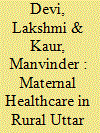

|
|
|
|
|
| Summary/Abstract |
This field-based study evaluates the impact of free maternal healthcare services on the healthcare-seeking behaviour of 125 pregnant women in six villages of Uttar Pradesh. The 87 Muslim and 38 non-Muslim women participating in this project appreciated the antenatal and postnatal care processes on offer. Yet, various government efforts to encourage women to give birth in government hospitals to comply with international benchmarks on reduction of maternal mortality rates were unsuccessful. The study explores the various reasons for the strategic choices made by these rural women, who continue to favour home-based delivery. The findings raise policy implications about how state financing of maternal healthcare provisions in India is to be delivered, in the best possible manner, at local levels.
|
|
|
|
|
|
|
|
|
|
|
|
|
|
|
|
| 6 |
ID:
174908
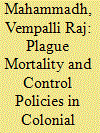

|
|
|
|
|
| Summary/Abstract |
Focused on colonial South India, this article presents and assesses detailed archival records of public health measures in response to plague outbreaks between 1900 and 1947. Starting in 1897 in the Madras Presidency, the colonial government strictly implemented anti-plague measures and introduced various health schemes and medical policies for plague prevention. However, despite partly vigorous government efforts, plague outbreaks could not be fully controlled. In the twentieth and twenty-first centuries, the plague remains among South Asia’s most feared epidemics, with an outbreak in Surat in 1994 causing major havoc. Neither indigenous knowledge nor Western medical systems provided fully effective remedies regarding causation, cure and prevention of plague epidemics. Since the article gained new relevance in light of current struggles faced by India’s public health system in handling the ongoing COVID-19 pandemic, some lessons from history emerge in the concluding discussion.
|
|
|
|
|
|
|
|
|
|
|
|
|
|
|
|
| 7 |
ID:
174912
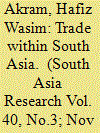

|
|
|
|
|
| Summary/Abstract |
This article analyses the causes of low intra-regional trade connections within South Asia, which have remained disappointing despite the long-awaited launch of the South Asian Free Trade Area (SAFTA) on 6 January 2004 in Islamabad. Analysis of World Bank data and other relevant sources for the period 1995–2018 shows that trade among SAFTA members has not increased as significantly as had been hoped. The statistical analysis undertaken confirms what was suspected by many observers, as it shows that the SAFTA countries are not actually natural trading partners. Rather they are often competitors, seeking to export the same product groups. Since this makes the prospects of future substantial increase in mutual trade unlikely, the article concludes with some reflections about how to strengthen regional trade support mechanisms.
|
|
|
|
|
|
|
|
|
|
|
|
|
|
|
|
|
|
|
|
|